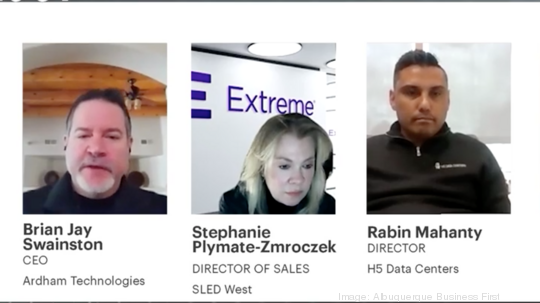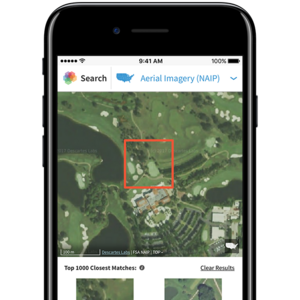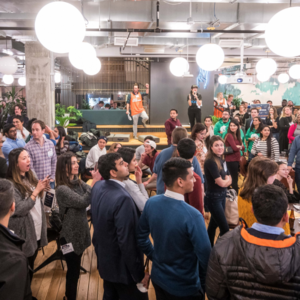
Work-from-home policies may be opening companies to cybersecurity threats.
That was one takeaway from an hourlong discussion hosted by Albuquerque Business First on the Future of Technology. The panel discussion included four tech insiders from companies including Comcast and Ardham Technologies. They sat down with ABF Publisher Keith Dennis to talk about some of the technological demands faced by companies in the age of Covid-19.
The panel participants included: Carlos Johnson, director of sales engineering at Comcast; Brian Swainston, CEO at Ardham Technologies; Stephanie Plymate Zmroczek, director of sales at SLED West; and Rabin Mahanty, director at H5 Data Centers.
Here are three takeaways from the conversation, which can be viewed in full.
Increased connectivity requires increased bandwidth
Those working from home may need more bandwidth — or the maximum rate of data transfer that can occur on a network — than they did before. With virtual meetings and other forms of digital communication becoming the norm, an insufficient internet connection could hamper productivity.
"As people become more dependent on connectivity, they become more dependent on bandwidth. And we've seen a lot of organizations have the need to start scaling" their networks, Swainston said during the discussion.
"At the end of the day, end users really care about is 'if I click this application, will it open and connect with my job. Can I service my customers if they call up and ask a question. If they call up are they going to be able to get through to me to make sure we're going to be able to satisfy what they need?"
At Comcast, the transition to working from home led to an increase in demand for residential bandwidth speeds, Johnson said. But it did the opposite in the business sector as offices shut down, he said. The situation led the company to make investments into equipment, he added.
Cybersecurity: take it seriously
The pandemic, which sent many workers home, "gave hackers a lot of room to grow," Plymate Zmroczek said. A November memo from Janelle Taylor Garcia, a program evaluator from the state's legislative finance committee, indicated the number of known cybersecurity incidents in New Mexico has risen considerably in recent years.
Work-from-home policies in particular may have introduced new challenges. Remote work has led companies to consider how to keep tabs on their employees' data practices, according to reporting from the Wall Street Journal.
"I have sensitive data and the best practices that we have to follow... I needed to implement [into] my home network," Plymate Zmroczek said.
Physical security is also a concern. Mahanty said H5, headquartered in Denver, is working with companies that want measures taken to thwart a USB drive being inserted.
Certain sectors, such as health care, have emerged as targets. Just last month, Haven Behavioral Hospital of Albuquerque provided notice of a cybersecurity incident that affected documents which "may include some combination" of information including medical history and health insurance info.
Develop a business continuity plan
Ardham Technologies' Swainston stressed the need for a business continuity plan, or a plan for overcoming issues so an organization can continue on with as little disruption as possible. Similarly, Mahanty talked about the importance of "being flexible."
Several organizations have had to adapt in some form or fashion during the pandemic, often using virtual technology. A common example is virtual events, which have taken the place of some in-person gatherings during the past year.
Electric Playhouse, an Albuquerque-based entertainment venue, reportedly tried to monetize what it called "community sessions," where those at the company host a virtual gathering focused on various topics, such as cooking tips with the company’s head chef. The pressure to prepare for the possibility of future shutdowns prompted the company to change its growth strategy, looking to put more money aside to build a larger safety net, Business First reported.




